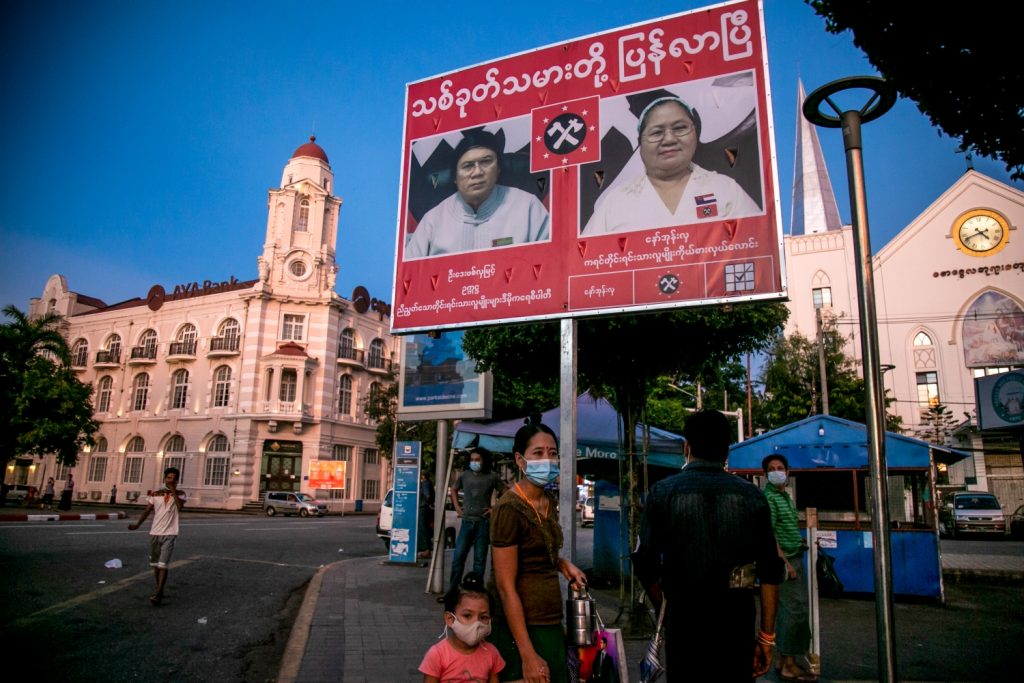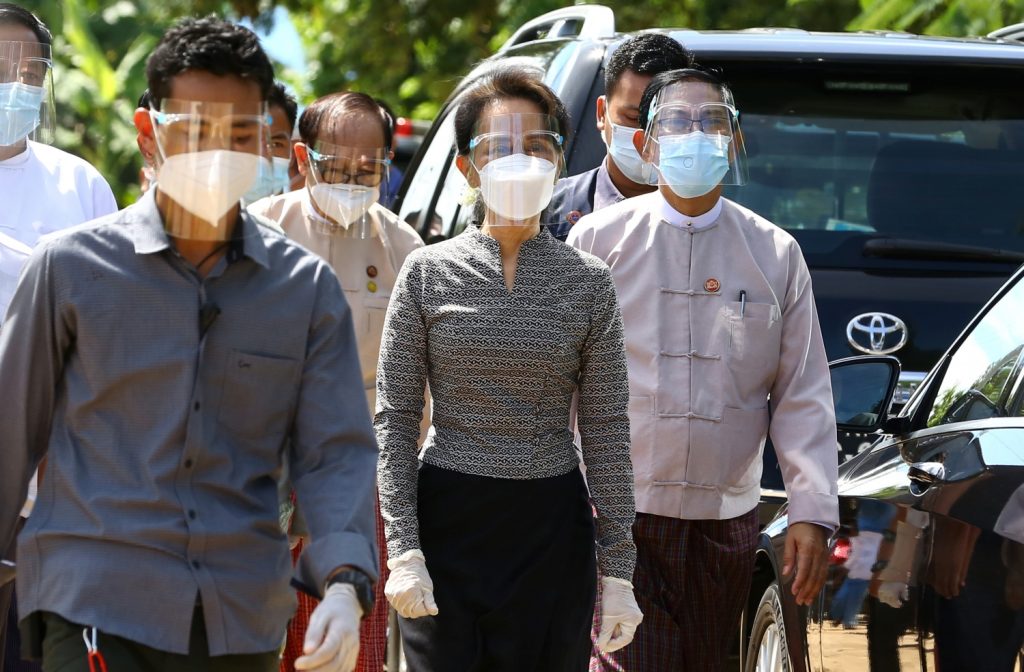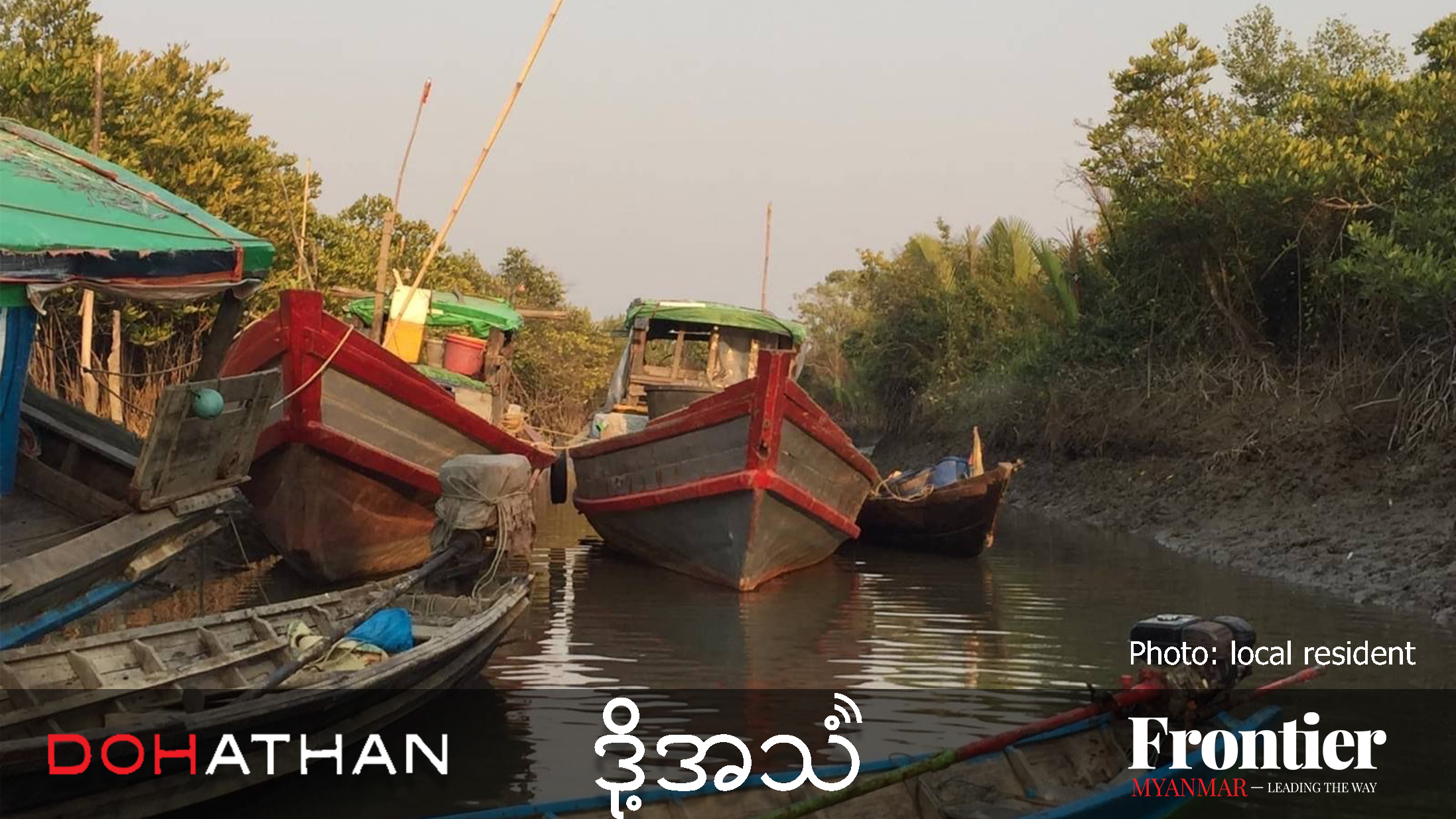The government is adamant that voting will go ahead on November 8, but many of the crucial components in a free and fair election are being hampered by COVID-19.
By EI EI TOE LWIN | FRONTIER
The dramatic increase in COVID-19 cases and fatalities in Myanmar has brought a chorus of calls from some political parties for the November 8 election to be postponed but they are falling on deaf ears at the headquarters of the ruling National League for Democracy and the Union Election Commission.
State Counsellor Daw Aung San Suu Kyi and the UEC have insisted that despite the high number of COVID-19 infections, the November 8 election will not be postponed. They have said that precautions aimed at preventing the spread of the coronavirus will ensure the election is held safely and fairly.
“Elections are as important as [fighting] the COVID-19 outbreak,” the state counsellor said during an online video conference with the leaders of NLD campaigns in Kachin, Kayah and Kayin states on September 29. “It can be said that elections are more important because we hope we can overcome the challenge of the COVID-19 after a vaccine is developed.”
The UEC is similarly determined to press on, and says it is taking necessary disease prevention measures at polling stations to ensure the election is held in line with guidelines issued by the Ministry of Health and Sports.
“We do not intend to postpone the general election because of the COVID-19,” UEC commissioner and spokesperson U Myint Naing told reporters during an online video discussion on September 19.
Myint Naing said the number of polling stations would be increased from about 40,000 to more than 50,000 to allow for more social distancing. Voters will be required to stay six feet apart and be allowed take about seven minutes to cast their ballot. At a meeting with district election sub-commission officers on September 22, UEC chair U Hla Thein said that at polling stations where more than 1,000 people were expected to vote, ballots would be cast in two shifts to avoid crowding, and at those for more than 2,000 voters, there would be three shifts.
On October 10, the UEC announced that some voters over 60 – who are most vulnerable to the coronavirus – will be allowed to vote in advance between October 25 and November 5. The measure is limited to 29 townships in Yangon and five in Mandalay that are under stay-at-home orders and have a population density of at least 5,000 people per square kilometre.
The commission has also allowed people who, because of COVID-19 travel restrictions, cannot return to the constituency where they are registered to vote on election day to apply to cast absentee ballots in advance. It has set an October 25 deadline for filing these applications at the nearest ward or village tract election sub-commission.
The comments by the state counsellor and UEC officials came amid a series of calls from political parties to the UEC to postpone the election. Not only did the deteriorating COVID-19 situation make a nationwide vote a dire threat to public health, the parties said, but the restrictions imposed to curb the virus had prevented a competitive campaign environment. The latter has put smaller, lesser-known parties at a particular disadvantage.
The calls were made separately by the main opposition Union Solidarity and Development Party and 22 allied parties, as well as the Democratic Party for a New Society and People’s Pioneer Party. In addition, the People’s Party, headed by former student leaders of the 1988 uprising, wrote to the UEC to request a dialogue with political parties and election-related civil society groups to discuss the situation. No such dialogue has happened.
Seeking to take the moral high ground amid the coronavirus threat, People’s Party chair U Ko Ko Gyi said on September 21 that his party had halted physical campaign activities because it believed it would be inappropriate to seek voters’ support “during this critical time”. A banner outside the party’s headquarters in Yangon reads, “the people’s health first, the election second”.
Political analysts have questioned the UEC’s reluctance to budge on the election date and say it should consider a postponement. “The health of the state and its citizens should come first and the election second,” said commentator U Yan Myo Thein. “Being stubborn about the election date is likely to cause chaos … I’m worried it’ll be a mess.”
Campaigns hobbled
Even in areas where door-to-door canvassing is possible, candidates have encountered hostility from residents fearful of being infected with COVID-19. Doi Bu, the Kachin State People’s Party vice chair and candidate for the Amyotha Hluttaw constituency of Kachin-11, encompassing Myitkyina, told Frontier that some rural communities were reluctant to grant entry to their villages. “Even if we are allowed in, we are not welcomed by the villagers,” Doi Bu said. “How can we campaign if we don’t trust each other? But I’m afraid of contracting the virus, too.”
Meanwhile, the stay-at-home order imposed in all Yangon Region townships (except Cocokyun) and all of Rakhine State,as well as some townships in Ayeyarwady, Bago and Mandalay regions and Mon and Kachin states, has made face-to-face campaigning unlawful.
Many parties are instead relying on social media to woo voters, but online campaign messages are not reaching voters in some areas. “We cannot rely on a mobile internet connection when we campaign in remote areas,” said USDP candidate Daw Aye Aye Tun, who is seeking election to the Pyithu Hluttaw in Mese Township, southern Kayah State.
Online campaigning had been useless in the seven townships in Rakhine State and Paletwa in southern Chin State, where the government continues to restrict internet access to 2G services, which support only voice calls and very limited data transmission.
Speaking before the UEC announced on October 16 that it was cancelling voting in nine of Rakhine’s Townships, U Tun Aung Kyaw, secretary of the Arakan National Party, said the lack of a reliable internet connection, COVID-19 restrictions, and fighting between the Tatmadaw and the Arakan Army had together made holding a credible election impossible in Rakhine. Voting has also been cancelled in 15 urban wards and nearly 140 village tracts in four other townships.
The UEC, which did not explain its decision, also cancelled voting in six whole townships and dozens of village tracts and wards in Shan State, and in parts of Bago Region and Kachin, Kayin and Mon states. Constituencies where voting has been cancelled entirely will be contested in future by-elections, if the UEC judges that conditions have improved, but the election will go ahead in constituencies where voting is cancelled only in particular areas. In three townships in Rakhine State – Ann, Kyaukphyu and Taungup – voting has been cancelled in so many wards and village tracts that as few as 10 percent of voters will be able to vote, casting doubt on the fairness of the vote there.
The constitution and electoral law give the UEC the discretion to cancel voting anywhere where a “free and fair election cannot be held due to natural disaster or due to the local security situation”. There are no published criteria for making this determination, and this lack of transparency, along with the UEC’s failure to consult with parties before announcing the cancellations, has fed suspicions that many of them were politically motivated.
Critics have pointed out that voting has not been cancelled in Paletwa Township in southern Chin, where the NLD won all seats in 2015, even though Paletwa is suffering from conflict that is just as intense as in the cancelled townships of northern and central Rakhine that were swept by the ANP in the election that year. Two rounds of cancellations were announced in 2015, on October 12 and 27, leaving open the possibility that Paletwa will later be cancelled, but it is unclear why such an insecure township was not included in the UEC’s October 16 announcement.

A constitutional crisis?
The government classified the COVID-19 pandemic as a natural disaster in April, allowing social controls to be enforced via the Natural Disaster Management Law. It also legally empowers the UEC to use COVID-19 as a reason for postponing the election in constituencies that are particularly hard hit by the virus, and this could be included in a possible second round of cancellations before election day.
However, opposition parties are arguing that the barriers to competitive campaigning and safe voting extend well-beyond the hardest-hit townships that are subject to stay-at-home orders, and are instead demanding a total postponement.
But for how long? Some worry that a delay of more than two months would result in a constitutional crisis that would trigger a state of emergency and open the door for the armed forces to re-enter frontline politics. The constitution states that the term of the Union parliament is five years from its first sitting, meaning new hluttaw representatives would need to be elected and sworn in by the end of January if Myanmar is to retain a functioning legislature.
However, the government could continue to function and the UEC still administer an election in the absence of parliament. The term of the election commission is tied to that the president, and the same is true of Aung San Suu Kyi’s state counsellor position.
Article 61 of the constitution says that although the term of the office of the president is five years, after this term expires, “the President and the Vice Presidents shall continue their duties until the time the new President is duly elected”. And according to articles 235, 240 and 262(m), all branches of the national and sub-national executive will be able to remain in office until a new president is chosen after a general election. Moreover, in the absence of parliament, article 212 of the charter says the president has the power to promulgate ordinances “for any administrative matter that needs immediate action” while parliament is not in session, except for “Union budget matters”.
As for a possible state of emergency, chapter 11 of the constitution, which details the circumstances under which one can be declared, makes no mention of election postponement. The president is only obliged to cede power to the military in the event of an emergency that threatens to “disintegrate the Union or disintegrate national solidarity or that may cause the loss of sovereignty, due to acts or attempts to take over the sovereignty of the Union by insurgency, violence and wrongful forcible means”.
In other emergency situations that lack a violent, existential threat to the country, the president can retain power and is obliged to “declare a military administrative order” only “if necessary”, according to section 413(b). In making these decisions, the president need only “coordinate” with the National Defence and Security Council, suggesting the decisions of the military-dominated body are not binding.
However, the absence of parliament for months would arguably be as harmful to democracy as a full-blown state of emergency. This has led some to suggest that the Constitutional Tribunal could approve an extension of parliament. Although the constitutional basis for doing so in unclear, the fact that the tribunal is appointed proportionally by the NLD president and the NLD-dominated lower and upper houses of parliament, for five-year a term that coincides with the government, means a request by the government for an extension will likely get a sympathetic hearing.
Political analyst Yan Myo Thein said it was clear that a postponement could occur without flouting the constitution. “That’s why the election needs to be postponed, at least in areas affected by stay-at-home orders,” he said.
However, another political analyst, National Literature Award-winner U Kyaw Win, was sceptical that legal manoeuvres to enable a postponement could avoid a confrontation with the Tatmadaw, who could use its raw power to take advantage of the situation.
“The definition of some [legal] provisions are open to interpretation, and Myanmar politics is not something that can be settled at court; it ultimately depends on decision makers, the NLD and Tatmadaw,” he said. “If a new parliament cannot be elected in time, the NLD and military have to negotiate. If they can cooperate and negotiate well, the country will move forward, if not our [democratic] gains will be reversed.”
Kyaw Win believed the NLD would hold the election as scheduled because no knows when the COVID-19 crisis will end. “The NLD is likely to hold the election on November 8 because it enjoys the strong support of a majority of the people and it will not surrender the opportunity to retain power,” he said.
Fewer eyes on the vote
Meanwhile, the pandemic, and the government response to it, is hampering other critical components in a credible election besides a level playing field for parties. One example is election monitoring.
Foreign missions have been unable to fly in observers from overseas because of a ban on commercial flights imposed on March 30 and repeatedly extended, most recently until October 30. The European Union, which fielded more than 100 foreign observers in 2015, has only been able to deploy an “expert” mission of four consultants; the United States-based Carter Center, which also had a large foreign mission in 2015, made the unprecedented move of recruiting Myanmar nationals as long-term observers to monitor the campaign period, though even their deployment has been limited by domestic travel restrictions.
In addition, domestic groups monitoring the election have had difficulty recruiting enough volunteers. “Hundreds of people applied to participate in the monitoring process but many quit because of concern about the spread of the virus,” said Ko Chan Lian, executive director of the Hornbill Organization. He said that almost 170 out of 470 short-term observers had since abandoned the mission, meaning Hornbill’s coverage on election day will be substantially smaller than in 2015, when it fielded 531 short-term observers.
Meanwhile, media coverage of the election campaign has been impeded by the government’s refusal to exempt journalists working for private sector outlets from stay-at-home orders in Yangon and elsewhere. Moreover, if based in the commercial capital, the ability to cover election day elsewhere in Myanmar is challenged not only by the possibility of continued travel restrictions but also the need to register with the relevant district election sub-commission by October 23. Failure to do so means a journalist will lack the accreditation necessary to enter polling stations and observe the voting and counting processes, and the UEC has not said whether it is possible to register remotely.
Foreign journalists are required to register with the Ministry of Information, after which they will be issued with accreditation cards by the UEC. However, the international commercial flight ban means that the number of foreign journalists in Myanmar on election day will be a fraction of what it was in 2015.
U Kyaw Swa Min, secretary of the Myanmar Press Council, told Frontier that the council was seeking talks with the UEC about its plans for media organisations, including whether reporters will be granted an exemption from COVID-19 travel and work restrictions to cover the election.
To date, the UEC has kept the Press Council in the dark, leaving yet another question mark over a crucial means of ensuring transparency in the vote.







